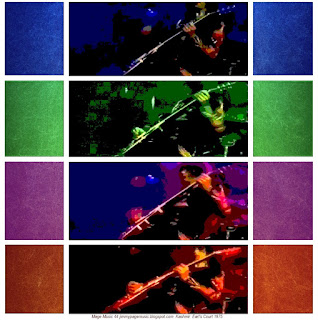“If ‘all is one’... then the consciousness of one person can… change the consciousness of a billion people.”
~ Joachim-Ernst Berendt 1
The concept of “all is one” is important for understanding how Magick works, since a Mage wields Magick to do one thing only: Change his own reality. In changing his own reality, a Mage can change the world.
Magick is another name for the source energy of the all-that-is. The process of Magick is one of aware, purposeful use of energy of the universe, as opposed to the unaware, unconscious use of energy that is how most human lives are lived.
Anyone can use Magick, but in fact only a few will. Most will want but few will do what it takes to get what they truly want.
The Mage understands that it is not having that fulfills desire, but rather being. A person does not have satisfaction and fulfillment - a person is in a state of being of satisfaction and fulfillment. Magick works because the Mage's whole reality is changed to the desired state of being.
The Path of Transformation
The Path of Transformation
Magic requires a clear and absolute understanding of the change in reality that is desired. This means knowing, feeling, hearing, seeing, smelling, sensing and understanding in every way exactly what the new reality will be before it comes into being.
To achieve this level of understanding, the Mage constantly refines desire to match the outcome as it is revealed to him, purposefully omitting other considerations (the inertia of existing reality - including other people’s possible desires) from his awareness, and using powerful and unrelenting will to hold that feeling while performing ritual.
It means making the new reality so real that the Mage no longer knows that the new reality doesn't yet exist. In essence, the source energy of the universe begins to resonate with the Mage and at that point, the ritual tips the transformation into manifestation.
The Time for Transformation
Unlike gods (or whatever spiritual being of your choice), which are the infinite stuff of source energy and therefore can manifest instantaneously, humans need time to manifest desires. The ritual of Magick provides the time. The more powerful – and pure - the desire and will, the less time is needed for ritual.
1 The World Is Sound: Nada Brahma: Music and the Landscape of Consciousness
Drawing from his friendships with composers and performers as well as his knowledge of new physics and Tantra, cybernetics, Sufism, and the works of Hermann Hesse, Berendt reveals the importance of sound in shaping cultural and spiritual life worldwide.
It means making the new reality so real that the Mage no longer knows that the new reality doesn't yet exist. In essence, the source energy of the universe begins to resonate with the Mage and at that point, the ritual tips the transformation into manifestation.
The Time for Transformation
Unlike gods (or whatever spiritual being of your choice), which are the infinite stuff of source energy and therefore can manifest instantaneously, humans need time to manifest desires. The ritual of Magick provides the time. The more powerful – and pure - the desire and will, the less time is needed for ritual.
Mages are finite, human beings. Mages who are also musicians can use the time provided by the ritual of music to hold the desire and will that will change reality. The ritual is music, the universe resonates with it and so do the humans who hear it.
When you invite the music into your heart, you invite Mage’s Magick into your own soul. In this way, without specifically intending to change you, the Mage effects change your own reality.
What was two - Mage and audience - is now one. In such small steps the world is changed.
What was two - Mage and audience - is now one. In such small steps the world is changed.
1 The World Is Sound: Nada Brahma: Music and the Landscape of Consciousness
Drawing from his friendships with composers and performers as well as his knowledge of new physics and Tantra, cybernetics, Sufism, and the works of Hermann Hesse, Berendt reveals the importance of sound in shaping cultural and spiritual life worldwide.
2 Reminder: I use the masculine pronoun but there’s nothing to say a Mage wouldn’t be female.
3 Enjoyed listening to Lucifer Rising, among other Jimmy Page works while writing this.
3 Enjoyed listening to Lucifer Rising, among other Jimmy Page works while writing this.










